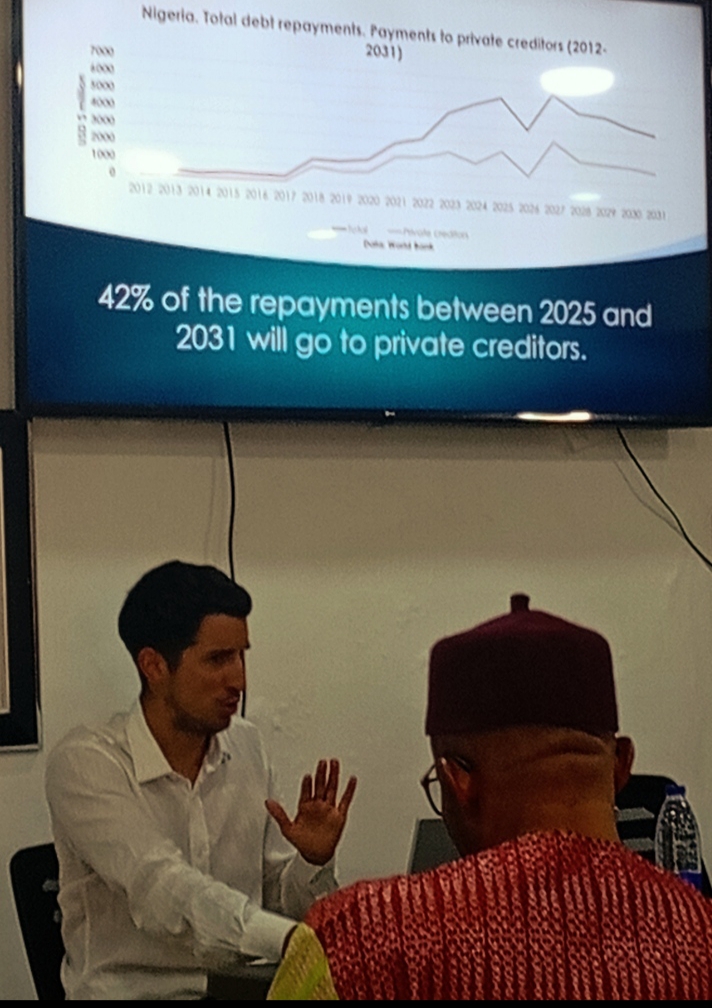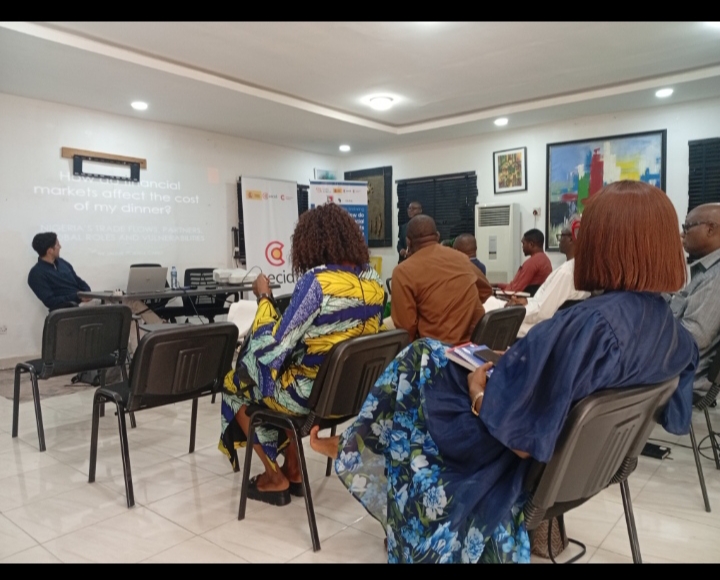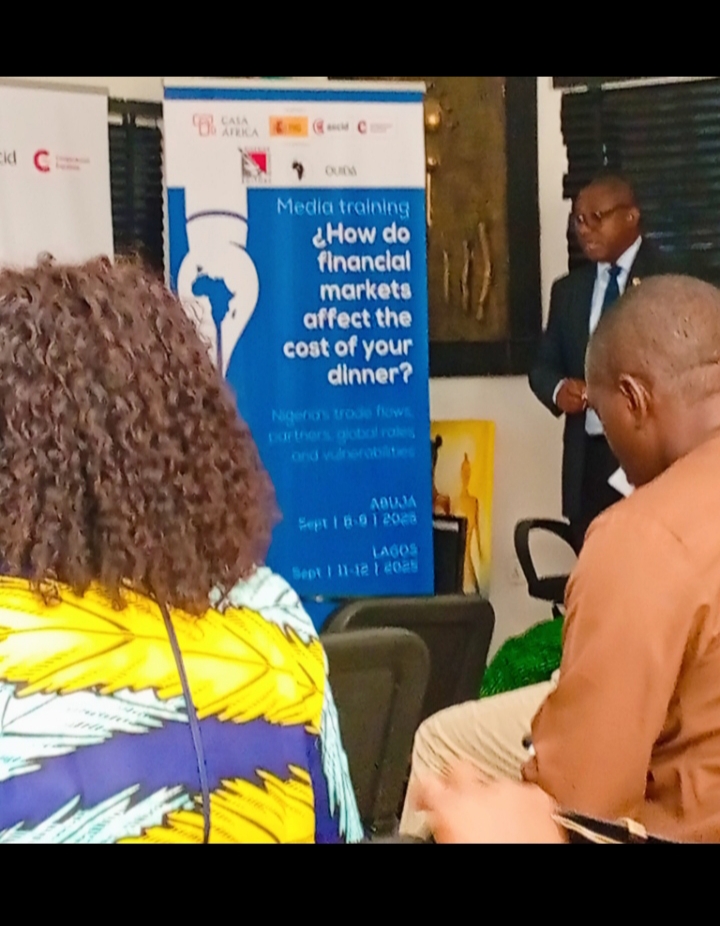How Financial Markets Affect Your Dinner Plate
. . . Economic Journalism Workshop Highlights the Power of Storytelling in Shaping Africa’s Economic Narrative
By Ejiro Umukoro
Abuja, Nigeria – In a joint intercultural exchange driven by The Embassy of Spain in Nigeria, in collaboration with the Nigeria Guild of Editors, journalists in managerial and editorial positions from across Abuja-based media organisations and digital platforms gathered for a two-day Economic Journalism Workshop. The powerful theme, “How Do Financial Markets Affect the Cost of Your Dinner?” sparked insightful discussions and debates among participants.
Facilitated by Eva Barta with the Embassy of Spain and led by the First Secretary of the Embassy of Spain, Juan Diego Martin Dembour, the workshop was handled by Jaume Portell Canõ, a journalist specialised in economics and international relations with a focus on the African Continent. Over two days, participants delved into the economic and political repositioning of Africa in the global economy and the media’s role in reshaping the narratives that propel the collective consciousness towards a stronger economic block for the African Continent.

As Cano explained, understanding economic structures is key to uncovering the truth. “Economics is like an X-ray machine that reveals a lot,” he said. “It’s not an impossible subject, but rather a distant noise that affects us all. The goal is to prove those wrong who say economics is only for experts. With a grasp of economics, we can prevent copy-pasting by economic experts and analysts.”
Cano highlighted the challenges of currency devaluation, citing Nigeria’s Naira as an example. “When you devalue your currency, it’s like a betrayal to your own people,” he noted. “Shopkeepers and banana sellers are often blamed, but who can trust the Naira when its value fluctuates wildly? For instance, the price of shrimp bought at a restaurant in Abuja, Nigeria, skyrocketed from N7,000 three years ago to N22,000 in 2025.”
The journalist also explored the economic implications of major events like the African Cup of Nations. Ivory Coast’s hosting of the tournament came with a hefty price tag, which the government struggled to pay back at high interest rates – over 8%. Cano questioned the long-term benefits of such investments, given that most stadiums would be underutilized after the event.
Cano emphasized the importance of data analysis in economic journalism. He recommended using tools like the Observatory of Economic Complexity (OEC) and COMTRADE, a UN dataset, to track trade flows and identify vulnerabilities in the economy. For instance, Nigeria’s import basket is heavily reliant on energy and food, making it vulnerable to market fluctuations.
Key Findings:
- African countries often struggle with mono-economies dependent on raw materials.
- Trade deficits and debt repayment in foreign currencies exacerbate economic woes.
- The International Monetary Fund (IMF) has significant influence, but its policies can have mixed results. As Cano noted, “The US has 50% of the votes in the IMF, so its power is strong. Why are US and European currencies never devalued?”
- The African continent has limited voting power in the IMF, with only 5% of the votes. “The time for the poor to vote, the time is over,” Cano lamented.

As Cano noted, he revealed interesting facts about global trade:
China’s beer industry follows IMF tools, but its economic influence is growing.
Senegal, despite being a significant player in the region, has one of the lowest per capita GDPs.
- The US has 50% of the votes in the IMF, so its power is strong
- The US always has 15.01% at least (key decisions need an 85.01% majority).
- The Netherlands tops cocoa exports despite not producing cocoa, thanks to its tax system.
- China’s beer industry follows IMF tools, but its economic influence is growing.
- Senegal’s GDP per capita isn’t among the lowest in the region, however their debt to GDP now is among the highest in Africa (top 3).
- South Korea’s refused IMF loans and advice, and instead, focused on building their industries. While theu didn’t refuse Western money, they ignored the standard recommendations by Western-led institutions and focused on building their industries.
To better understand the economy, Cano suggested looking at everyday products like food. “Talk to people around you, and you’ll get a glimpse of the economy,” he advised. “In Gambia, aquaculture is dominated by Chinese-owned factories, which has implications for local economies.”
By analyzing economic structures and data, journalists can uncover the stories behind the numbers and hold those in power accountable. As Cano put it, “The job of the journalist is to question to get to the bottom of the truth.”
How Financial Markets Affect Your Dinner Plate
- Observatory of Economic Complexity (OEC)
- COMTRADE (UN dataset)
- Trading Economics
- Indonesia’s statistics department (for HS Codes)
- COMTRADE Plus ((link unavailable))
This story highlights the complexities of economic journalism and the importance of data analysis in uncovering the truth. By exploring the intersections of economics, politics, and everyday life, journalists can provide readers with a deeper understanding of the issues that shape their world.
At the end of the Day One Workshop, Cano concluded, “Let’s change the narrative. Instead of blaming corruption, let’s look at the economic structures that perpetuate inequality. South Korea’s story is a case in point – they refused IMF loans and advice, and instead, focused on building their industries.”
Editors and media managers who attended the event had a robust and in-depth discussion that enabled them to grasp the new role the Nigerian media must play to begin a new economic and inspiring narrative that empowers both citizens, electorates, and elected officials to reimagine the economic opportunities and strategies Nigeria needs to adopt and implement going forward.






Comments